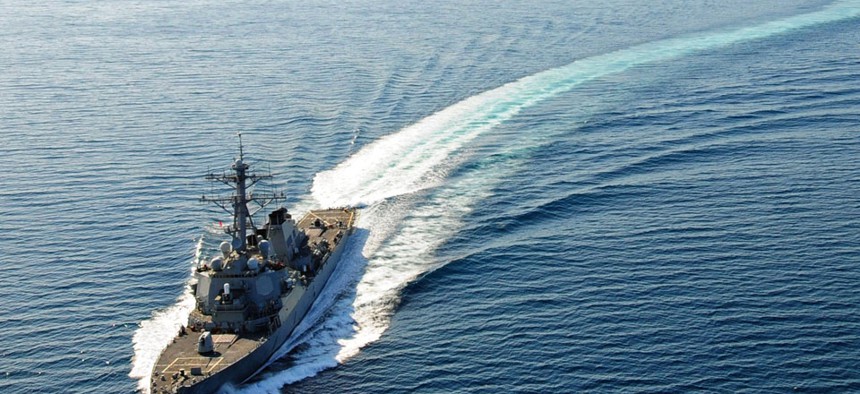New Navy Shipboard Net Key to Information Dominance

The guided-missile destroyer USS Higgins operates off the coast of Haiti. U.S. Navy
Upgraded network aims to automate cyber defense.
The Navy’s $2.5 billion shipboard-network contract awarded Wednesday is critical to the service’s push for information dominance in future wars.
That’s according to Rear Adm. Christian Becker, the program executive officer for command, control, communications and intelligence at the Space and Naval Warfare Systems Command, who discussed the service’s plans during a press briefing yesterday.
The recent contract award follows an Aug. 7 speech at SPAWAR by Chief of Naval Operations Adm. Jonathan Greenert, who said the San Diego-based command is the technical agent for information dominance and “is also the technical agent for a new era in Navy and naval warfare. Control of the information is going to be the key to the future.”
Becker said the Navy’s Consolidated Afloat Networks and Enterprise Services, or CANES, program will automate shipboard cyber systems. Tests of CANES hardware and software earlier this month on the USS Higgins showed cyber software updates for multiple shipboards systems can be done automatically and remotely, Becker said, rather than sailors having to manually make the changes.
System Includes Cyber-Protection Tools
Capt. William “Ben” McNeal, Navy tactical networks program manager, said during Thursday's press briefing cyber tools available from CANES include firewalls and intrusion detection systems.
Cyber systems are just one of five domains in CANES that will provide standardized shipboard systems, McNeal said. The other CANES domains are systems management, the core enterprise-services domain which includes some 200 applications, the communications domain built around routers and switchers, and a computing infrastructure of standardized end user devices.
McNeal declined to identify CANES hardware or software by brand name due to “acquisition sensitivity”.
The Navy currently plans to install CANES on at least 180 ships by 2022, but that number could increase as new ships are added to the fleet, McNeal said. CANES software will be upgraded every two years and hardware every four years over the eight-year life of the contract, he said.
System Will Connect Shipboard Net to the Cloud -- Eventually
SPAWAR eventually wants to use CANES to connect shipboard systems to information stored in the cloud, a challenge considering the bandwidth limitations of satellite connections, Becker acknowledged. SPAWAR is working with the Office of Naval Research to figure out how to tap into the cloud from deployed ships, he said.
Because aircraft carriers and large deck amphibious ships have more robust satellite connections than smaller ships, they would be the first to tap into cloud based data, Becker said.
Five companies -- BAE Systems Technology Solutions & Services, General Dynamics C4 Systems, Global Technical Systems, Northrop Grumman Systems Corp. and Serco, Inc. -- all won indefinite-delivery, indefinite-quantity, firm-fixed-price, cost-plus-fixed-fee contracts for CANES and will compete for task orders through the life of the contract. To start, each will be awarded a task order to equip a destroyer with the CANES network. McNeal said.






